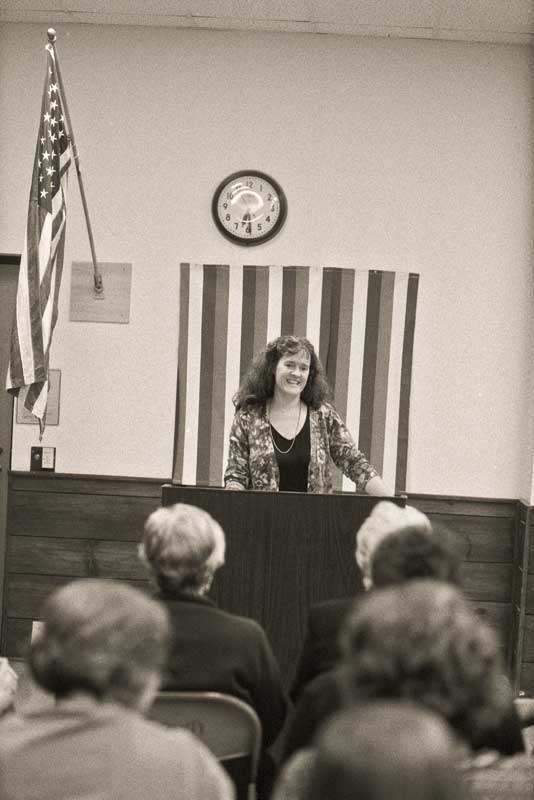Town Meeting Tips
Make a Name for Yourself Some old-timers like to tell new residents not to speak at their first or (gulp) even first five Town Meetings. Nonsense, says Susan Clark. But picking your speaking spots is important. “There’s a trust that needs to develop,” she says. “If you just go in there and say, This is […]

Sixth-generation Vermonter Susan Clark, co-author of All Those in Favor, is the moderator for Middlesex, Vermont, her hometown.
Photo Credit : Charney, JaredMake a Name for Yourself
Some old-timers like to tell new residents not to speak at their first or (gulp) even first five Town Meetings. Nonsense, says Susan Clark. But picking your speaking spots is important. “There’s a trust that needs to develop,” she says. “If you just go in there and say, This is how we did it where I used to live, you won’t find fertile ground for those seeds.”
Keep It Casual
Don’t overlook the way you dress, Clark says. “It’s a part of your presentation,” she stresses. And because you’re going to be with people from all walks of life–executives to farmers–just remember not to over- or under-do your duds.
Eat Up
Clark once attended a town meeting that lasted more than seven hours–which is to say, if you don’t come prepared, you may go a long time without eating. Food can also serve as a peacemaker between citizens divided over an issue. “You can go up to that person you’ve disagreed with and say, Try this macaroni-and-cheese my wife made for Town Meeting,” Clark says. “It helps break the tension.”
Pace Yourself
Hey, it’s okay if you’re a little more interested in the town’s operating-budget spike than that small capital expenditure for a future plow. Clark says you’re even permitted to take a break. “Go out and walk around,” she advises. Or bring some handwork, like knitting, to keep you busy: “It can help you concentrate.”
Step Away From the Mic
It’s not an uncommon situation: You’ve got something you want to say, but you’ve also got a healthy fear of public speaking. One way to ease the pain is to forgo using a microphone. “[Equipment] emphasizes that this is a public moment,” Clark explains. “And that’s scary.”
About That Time
“Unless you’re an expert brought in by the town to speak about something, keep what you have to say under three minutes,” Clark notes. “That’s about how long somebody is willing to listen to somebody else.” Put another way: If you see people shifting in their chairs or talking to one another, it’s time to finish up. Fast.
Question Authority
Whether it’s a request for a procedural clarification or a specific question about a warrant article under discussion, Clark says you should never hesitate to voice your confusion. “If it’s something you want to ask, somebody else is thinking the same thing,” she adds. “That’s what we’re there for: to strengthen our decisions by making our decisions better informed.”
Ian Aldrich
Ian Aldrich is the Senior Features Editor at Yankee magazine, where he has worked for more for nearly two decades. As the magazine’s staff feature writer, he writes stories that delve deep into issues facing communities throughout New England. In 2019 he received gold in the reporting category at the annual City-Regional Magazine conference for his story on New England’s opioid crisis. Ian’s work has been recognized by both the Best American Sports and Best American Travel Writing anthologies. He lives with his family in Dublin, New Hampshire.
More by Ian Aldrich

